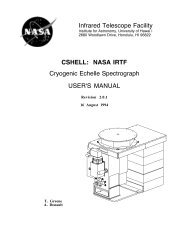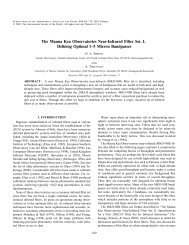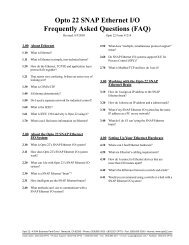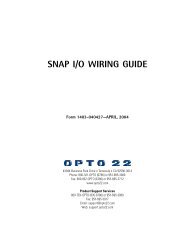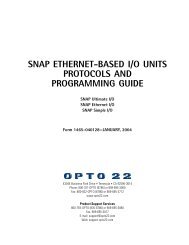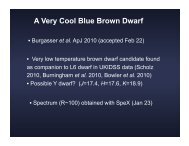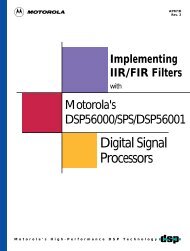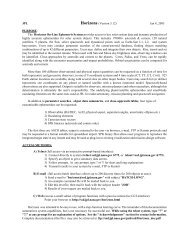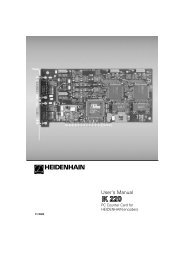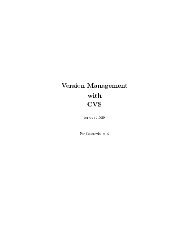- Page 1 and 2:
ISE 10.1 CPLD Libraries Guide
- Page 3 and 4:
Table of Contents About this Guide.
- Page 5 and 6:
CDD4CLE ...........................
- Page 7 and 8:
FTC................................
- Page 9 and 10:
OR5B1..............................
- Page 11:
About this Guide This guide is part
- Page 14 and 15:
Design Element Description BUFE4 Ma
- Page 16 and 17:
Design Element Description Function
- Page 18 and 19:
Design Element Description Function
- Page 20 and 21:
Design Element Description Function
- Page 22 and 23:
Design Element Description OBUFT Pr
- Page 24 and 25:
Design Element Description NOR3B2 P
- Page 26 and 27:
Design Element Description Function
- Page 29 and 30:
About Design Elements This section
- Page 31 and 32:
About Design Elements For More Info
- Page 33 and 34:
About Design Elements B0 for ACC16)
- Page 35 and 36:
About Design Elements • For twos-
- Page 37 and 38:
About Design Elements B0 for ACC8)
- Page 39 and 40:
About Design Elements ADD16 Macro:
- Page 41 and 42:
About Design Elements ADD4 Macro: 4
- Page 43 and 44:
About Design Elements ADD8 Macro: 8
- Page 45 and 46:
About Design Elements ADSU1 Macro:
- Page 47 and 48:
About Design Elements ADSU16 Macro:
- Page 49 and 50:
About Design Elements ADSU4 Macro:
- Page 51 and 52:
About Design Elements ADSU8 Macro:
- Page 53 and 54:
About Design Elements AND2 Primitiv
- Page 55 and 56:
About Design Elements AND2B2 Primit
- Page 57 and 58:
About Design Elements AND3B1 Primit
- Page 59 and 60:
About Design Elements AND3B3 Primit
- Page 61 and 62:
About Design Elements AND4B1 Primit
- Page 63 and 64:
About Design Elements AND4B3 Primit
- Page 65 and 66:
About Design Elements AND5 Primitiv
- Page 67 and 68:
About Design Elements AND5B2 Primit
- Page 69 and 70:
About Design Elements AND5B4 Primit
- Page 71 and 72:
About Design Elements AND6 Macro: 6
- Page 73 and 74:
About Design Elements AND8 Macro: 8
- Page 75 and 76:
About Design Elements BRLSHFT4 Macr
- Page 77 and 78:
About Design Elements For More Info
- Page 79 and 80:
About Design Elements BUF16 Macro:
- Page 81 and 82:
About Design Elements BUF8 Macro: 8
- Page 83 and 84:
About Design Elements BUFE16 Macro:
- Page 85 and 86:
About Design Elements BUFE8 Macro:
- Page 87 and 88:
About Design Elements BUFG BUFG_ins
- Page 89 and 90:
About Design Elements BUFGTS Primit
- Page 91 and 92:
About Design Elements BUFT16 Macro:
- Page 93 and 94:
About Design Elements BUFT8 Macro:
- Page 95 and 96:
About Design Elements For More Info
- Page 97 and 98:
About Design Elements Design Entry
- Page 99 and 100:
About Design Elements Inputs Output
- Page 101 and 102:
About Design Elements For More Info
- Page 103 and 104:
About Design Elements Inputs Output
- Page 105 and 106:
About Design Elements Logic Table I
- Page 107 and 108:
About Design Elements Logic Table I
- Page 109 and 110:
About Design Elements For More Info
- Page 111 and 112:
About Design Elements Inputs Output
- Page 113 and 114:
About Design Elements Inputs Output
- Page 115 and 116:
About Design Elements For More Info
- Page 117 and 118:
About Design Elements Inputs Output
- Page 119 and 120:
About Design Elements The counter i
- Page 121 and 122:
About Design Elements The counter i
- Page 123 and 124:
About Design Elements Design Entry
- Page 125 and 126:
About Design Elements Inputs Output
- Page 127 and 128:
About Design Elements Logic Table I
- Page 129 and 130:
About Design Elements Design Entry
- Page 131 and 132:
About Design Elements Inputs Output
- Page 133 and 134:
About Design Elements When cascadin
- Page 135 and 136:
About Design Elements The counter i
- Page 137 and 138:
About Design Elements For More Info
- Page 139 and 140:
About Design Elements Design Entry
- Page 141 and 142:
About Design Elements Inputs Output
- Page 143 and 144:
About Design Elements For More Info
- Page 145 and 146:
About Design Elements Inputs Output
- Page 147 and 148:
About Design Elements Logic Table I
- Page 149 and 150:
About Design Elements Logic Table I
- Page 151 and 152:
About Design Elements For More Info
- Page 153 and 154:
About Design Elements Inputs Output
- Page 155 and 156:
About Design Elements Inputs Output
- Page 157 and 158:
About Design Elements For More Info
- Page 159 and 160:
About Design Elements Inputs Output
- Page 161 and 162:
About Design Elements Logic Table I
- Page 163 and 164:
About Design Elements Logic Table I
- Page 165 and 166:
About Design Elements For More Info
- Page 167 and 168:
About Design Elements Inputs Output
- Page 169 and 170:
About Design Elements Inputs Output
- Page 171 and 172:
About Design Elements Design Entry
- Page 173 and 174:
About Design Elements Inputs Output
- Page 175 and 176:
About Design Elements Logic Table I
- Page 177 and 178:
About Design Elements Logic Table I
- Page 179 and 180:
About Design Elements Design Entry
- Page 181 and 182:
About Design Elements Inputs Output
- Page 183 and 184:
About Design Elements Inputs Output
- Page 185 and 186:
About Design Elements Design Entry
- Page 187 and 188:
About Design Elements Inputs Output
- Page 189 and 190:
About Design Elements This counter
- Page 191 and 192:
About Design Elements This counter
- Page 193 and 194:
About Design Elements For More Info
- Page 195 and 196:
About Design Elements Inputs Output
- Page 197 and 198:
About Design Elements Inputs Output
- Page 199 and 200:
About Design Elements For More Info
- Page 201 and 202:
About Design Elements Inputs Output
- Page 203 and 204:
About Design Elements Logic Table I
- Page 205 and 206:
About Design Elements Logic Table I
- Page 207 and 208:
About Design Elements Logic Table I
- Page 209 and 210:
About Design Elements This counter
- Page 211 and 212:
About Design Elements Logic Table I
- Page 213 and 214:
About Design Elements This counter
- Page 215 and 216:
About Design Elements Logic Table I
- Page 217 and 218:
About Design Elements This counter
- Page 219 and 220:
About Design Elements Logic Table I
- Page 221 and 222:
About Design Elements CJ4CE Macro:
- Page 223 and 224:
About Design Elements CJ5CE Macro:
- Page 225 and 226:
About Design Elements CJ8CE Macro:
- Page 227 and 228:
About Design Elements CJD4CE Macro:
- Page 229 and 230:
About Design Elements CJD5CE Macro:
- Page 231 and 232:
About Design Elements CJD8CE Macro:
- Page 233 and 234:
About Design Elements CLK_DIV10 Pri
- Page 235 and 236:
About Design Elements CLK_DIV10R Pr
- Page 237 and 238:
About Design Elements CLK_DIV10RSD
- Page 239 and 240:
About Design Elements CLK_DIV10SD P
- Page 241 and 242:
About Design Elements CLK_DIV12 Pri
- Page 243 and 244:
About Design Elements CLK_DIV12R Pr
- Page 245 and 246:
About Design Elements CLK_DIV12RSD
- Page 247 and 248:
About Design Elements CLK_DIV12SD P
- Page 249 and 250:
About Design Elements CLK_DIV14 Pri
- Page 251 and 252:
About Design Elements CLK_DIV14R Pr
- Page 253 and 254:
About Design Elements CLK_DIV14RSD
- Page 255 and 256:
About Design Elements CLK_DIV14SD P
- Page 257 and 258:
About Design Elements CLK_DIV16 Pri
- Page 259 and 260:
About Design Elements CLK_DIV16R Pr
- Page 261 and 262:
About Design Elements CLK_DIV16RSD
- Page 263 and 264:
About Design Elements CLK_DIV16SD P
- Page 265 and 266:
About Design Elements CLK_DIV2 Prim
- Page 267 and 268:
About Design Elements CLK_DIV2R Pri
- Page 269 and 270:
About Design Elements CLK_DIV2RSD P
- Page 271 and 272:
About Design Elements CLK_DIV2SD Pr
- Page 273 and 274:
About Design Elements CLK_DIV4 Prim
- Page 275 and 276:
About Design Elements CLK_DIV4R Pri
- Page 277 and 278:
About Design Elements CLK_DIV4RSD P
- Page 279 and 280:
About Design Elements CLK_DIV4SD Pr
- Page 281 and 282:
About Design Elements CLK_DIV6 Prim
- Page 283 and 284:
About Design Elements CLK_DIV6R Pri
- Page 285 and 286:
About Design Elements CLK_DIV6RSD P
- Page 287 and 288:
About Design Elements CLK_DIV6SD Pr
- Page 289 and 290:
About Design Elements CLK_DIV8 Prim
- Page 291 and 292:
About Design Elements CLK_DIV8R Pri
- Page 293 and 294:
About Design Elements CLK_DIV8RSD P
- Page 295 and 296:
About Design Elements CLK_DIV8SD Pr
- Page 297 and 298:
About Design Elements COMP16 Macro:
- Page 299 and 300:
About Design Elements COMP4 Macro:
- Page 301 and 302:
About Design Elements COMPM16 Macro
- Page 303 and 304:
About Design Elements COMPM4 Macro:
- Page 305 and 306:
About Design Elements Design Entry
- Page 307 and 308:
About Design Elements CR8CE Macro:
- Page 309 and 310:
About Design Elements CRD8CE Macro:
- Page 311 and 312:
About Design Elements D3_8E Macro:
- Page 313 and 314:
About Design Elements FD Macro: D F
- Page 315 and 316:
About Design Elements FD16CE Macro:
- Page 317 and 318:
About Design Elements FD4 Macro: Mu
- Page 319 and 320:
About Design Elements • See the a
- Page 321 and 322: About Design Elements • See the a
- Page 323 and 324: About Design Elements FD8CE Macro:
- Page 325 and 326: About Design Elements FDC Macro: D
- Page 327 and 328: About Design Elements VHDL Instanti
- Page 329 and 330: About Design Elements For More Info
- Page 331 and 332: About Design Elements Port Descript
- Page 333 and 334: About Design Elements FDD Macro: Du
- Page 335 and 336: About Design Elements FDD16CE Macro
- Page 337 and 338: About Design Elements FDD4 Macro: M
- Page 339 and 340: About Design Elements FDD4RE Macro:
- Page 341 and 342: About Design Elements FDD8CE Macro:
- Page 343 and 344: About Design Elements FDDC Macro: D
- Page 345 and 346: About Design Elements • See the a
- Page 347 and 348: About Design Elements FDDCPE Macro:
- Page 349 and 350: About Design Elements FDDPE Primiti
- Page 351 and 352: About Design Elements FDDR Macro: D
- Page 353 and 354: About Design Elements FDDRS Macro:
- Page 355 and 356: About Design Elements FDDRSE Macro:
- Page 357 and 358: About Design Elements FDDS Macro: D
- Page 359 and 360: About Design Elements FDDSR Macro:
- Page 361 and 362: About Design Elements FDDSRE Macro:
- Page 363 and 364: About Design Elements FDP Macro: D
- Page 365 and 366: About Design Elements FDPE Primitiv
- Page 367 and 368: About Design Elements FDR Macro: D
- Page 369 and 370: About Design Elements FDRS Macro: D
- Page 371: About Design Elements FDRSE Macro:
- Page 375 and 376: About Design Elements • See the a
- Page 377 and 378: About Design Elements FDSRE Macro:
- Page 379 and 380: About Design Elements FJKCE Macro:
- Page 381 and 382: About Design Elements • See the a
- Page 383 and 384: About Design Elements For More Info
- Page 385 and 386: About Design Elements FJKPE Macro:
- Page 387 and 388: About Design Elements FJKRSE Macro:
- Page 389 and 390: About Design Elements FJKSRE Macro:
- Page 391 and 392: About Design Elements FTC Primitive
- Page 393 and 394: About Design Elements FTCLE Macro:
- Page 395 and 396: About Design Elements FTCP Primitiv
- Page 397 and 398: About Design Elements FTCPLE Macro:
- Page 399 and 400: About Design Elements FTDCE Macro:
- Page 401 and 402: About Design Elements For More Info
- Page 403 and 404: About Design Elements For More Info
- Page 405 and 406: About Design Elements FTDRSE Macro:
- Page 407 and 408: About Design Elements Inputs Output
- Page 409 and 410: About Design Elements FTPE Macro: T
- Page 411 and 412: About Design Elements For More Info
- Page 413 and 414: About Design Elements FTRSLE Macro:
- Page 415 and 416: About Design Elements FTSRE Macro:
- Page 417 and 418: About Design Elements Design Entry
- Page 419 and 420: About Design Elements IBUF Primitiv
- Page 421 and 422: About Design Elements • See the a
- Page 423 and 424:
About Design Elements Note Consult
- Page 425 and 426:
About Design Elements Attribute Typ
- Page 427 and 428:
About Design Elements Note Consult
- Page 429 and 430:
About Design Elements INV16 Macro:
- Page 431 and 432:
About Design Elements INV8 Macro: E
- Page 433 and 434:
About Design Elements Verilog Insta
- Page 435 and 436:
About Design Elements -- End of KEE
- Page 437 and 438:
About Design Elements LD16 Macro: M
- Page 439 and 440:
About Design Elements For More Info
- Page 441 and 442:
About Design Elements LDC Macro: Tr
- Page 443 and 444:
About Design Elements LDCP Primitiv
- Page 445 and 446:
About Design Elements LDG Primitive
- Page 447 and 448:
About Design Elements LDG4 Macro: 4
- Page 449 and 450:
About Design Elements LDP Macro: Tr
- Page 451 and 452:
About Design Elements M16_1E Macro:
- Page 453 and 454:
About Design Elements M2_1 Macro: 2
- Page 455 and 456:
About Design Elements M2_1B2 Macro:
- Page 457 and 458:
About Design Elements M4_1E Macro:
- Page 459 and 460:
About Design Elements For More Info
- Page 461 and 462:
About Design Elements NAND2B1 Primi
- Page 463 and 464:
About Design Elements NAND3 Primiti
- Page 465 and 466:
About Design Elements NAND3B2 Primi
- Page 467 and 468:
About Design Elements NAND4 Primiti
- Page 469 and 470:
About Design Elements NAND4B2 Primi
- Page 471 and 472:
About Design Elements NAND4B4 Primi
- Page 473 and 474:
About Design Elements NAND5B1 Primi
- Page 475 and 476:
About Design Elements NAND5B3 Primi
- Page 477 and 478:
About Design Elements NAND5B5 Primi
- Page 479 and 480:
About Design Elements NAND7 Macro:
- Page 481 and 482:
About Design Elements NAND9 Macro:
- Page 483 and 484:
About Design Elements NOR2B1 Primit
- Page 485 and 486:
About Design Elements NOR3 Primitiv
- Page 487 and 488:
About Design Elements NOR3B2 Primit
- Page 489 and 490:
About Design Elements NOR4 Primitiv
- Page 491 and 492:
About Design Elements NOR4B2 Primit
- Page 493 and 494:
About Design Elements NOR4B4 Primit
- Page 495 and 496:
About Design Elements NOR5B1 Primit
- Page 497 and 498:
About Design Elements NOR5B3 Primit
- Page 499 and 500:
About Design Elements NOR5B5 Primit
- Page 501 and 502:
About Design Elements NOR7 Macro: 7
- Page 503 and 504:
About Design Elements NOR9 Macro: 9
- Page 505 and 506:
About Design Elements Attribute Typ
- Page 507 and 508:
About Design Elements • See the a
- Page 509 and 510:
About Design Elements For More Info
- Page 511 and 512:
About Design Elements • See the a
- Page 513 and 514:
About Design Elements OBUFE16 Macro
- Page 515 and 516:
About Design Elements OBUFE8 Macro:
- Page 517 and 518:
About Design Elements Available Att
- Page 519 and 520:
About Design Elements For More Info
- Page 521 and 522:
About Design Elements Attribute Typ
- Page 523 and 524:
About Design Elements For More Info
- Page 525 and 526:
About Design Elements OR2B1 Primiti
- Page 527 and 528:
About Design Elements OR3 Primitive
- Page 529 and 530:
About Design Elements OR3B2 Primiti
- Page 531 and 532:
About Design Elements OR4 Primitive
- Page 533 and 534:
About Design Elements OR4B2 Primiti
- Page 535 and 536:
About Design Elements OR4B4 Primiti
- Page 537 and 538:
About Design Elements OR5B1 Primiti
- Page 539 and 540:
About Design Elements OR5B3 Primiti
- Page 541 and 542:
About Design Elements OR5B5 Primiti
- Page 543 and 544:
About Design Elements OR7 Macro: 7-
- Page 545 and 546:
About Design Elements OR9 Macro: 9-
- Page 547 and 548:
About Design Elements ); -- End of
- Page 549 and 550:
About Design Elements -- End of PUL
- Page 551 and 552:
About Design Elements • See the a
- Page 553 and 554:
About Design Elements Design Entry
- Page 555 and 556:
About Design Elements Inputs Output
- Page 557 and 558:
About Design Elements • See the a
- Page 559 and 560:
About Design Elements Inputs Output
- Page 561 and 562:
About Design Elements Inputs Output
- Page 563 and 564:
About Design Elements • See the a
- Page 565 and 566:
About Design Elements Inputs Output
- Page 567 and 568:
About Design Elements Inputs Output
- Page 569 and 570:
About Design Elements • See the a
- Page 571 and 572:
About Design Elements Inputs Output
- Page 573 and 574:
About Design Elements Inputs Output
- Page 575 and 576:
About Design Elements • See the a
- Page 577 and 578:
About Design Elements Design Entry
- Page 579 and 580:
About Design Elements Design Entry
- Page 581 and 582:
About Design Elements • See the a
- Page 583 and 584:
About Design Elements Inputs Output
- Page 585 and 586:
About Design Elements Inputs Output
- Page 587 and 588:
About Design Elements For More Info
- Page 589 and 590:
About Design Elements Inputs Output
- Page 591 and 592:
About Design Elements Inputs Output
- Page 593 and 594:
About Design Elements Design Entry
- Page 595 and 596:
About Design Elements Inputs Output
- Page 597 and 598:
About Design Elements Inputs Output
- Page 599 and 600:
About Design Elements For More Info
- Page 601 and 602:
About Design Elements Inputs Output
- Page 603 and 604:
About Design Elements Inputs Output
- Page 605 and 606:
About Design Elements Design Entry
- Page 607 and 608:
About Design Elements Inputs Output
- Page 609 and 610:
About Design Elements Inputs Output
- Page 611 and 612:
About Design Elements For More Info
- Page 613 and 614:
About Design Elements Inputs Output
- Page 615 and 616:
About Design Elements Inputs Output
- Page 617 and 618:
About Design Elements Design Entry
- Page 619 and 620:
About Design Elements Inputs Output
- Page 621 and 622:
About Design Elements Inputs Output
- Page 623 and 624:
About Design Elements XNOR2 Primiti
- Page 625 and 626:
About Design Elements XNOR4 Primiti
- Page 627 and 628:
About Design Elements XNOR6 Macro:
- Page 629 and 630:
About Design Elements XNOR8 Macro:
- Page 631 and 632:
About Design Elements XOR2 Primitiv
- Page 633 and 634:
About Design Elements XOR4 Primitiv
- Page 635 and 636:
About Design Elements XOR6 Macro: 6
- Page 637 and 638:
About Design Elements XOR8 Macro: 8



